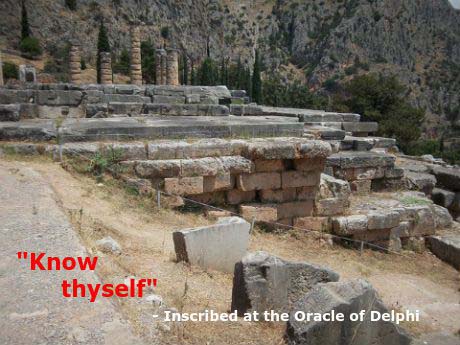What Is Self Awareness, And Why Should I Care? #2

Now, really: what is self awareness? As we saw in the last post, there’s more to self awareness than might first meet the eye.

Precinct of the Prophetess, Delphi, Greece
“Gnothi seauton”… “Know thyself” These words were known to the ancient Greeks, and were so precious that they were inscribed in the forecourt of the Temple of Apollo at Delphi, the ancient world’s most important oracular site.
Great words… how do we make them real for ourselves, now?

Self-Awareness as Treasure
If you study the myth and wisdom of the human race, you quickly learn that self awareness has been viewed in many, many cultures as a treasure.
There is one thing that is universally characteristic of treasures: they are generally thought of that way, because they aren’t the easiest thing to get.
Many feel they know themselves. What they generally mean is that they know the ego, the conscious portion of the personality, reasonably well. Yet, the kind of “self-awareness” that really makes a difference happens on a whole other plane. It’s usually about relating to parts of ourselves that are either partially or almost completely unknown to consciousness.
[cta-newsletter]
The Dialogue with the Undiscovered Self
The “price tag” for self awareness most often relates to the gradual discovery of what /a-midlife-transition refers to as “the undiscovered self”. We learn that we are something other than we seem to be to the ego, when it tells itself its stories. As Jung stresses, and others echo in varying language:

The experience of the self is always a defeat for the ego.
We turn out to be someone other than who the ego would like to believe itself to be.
In everyday consciousness, the ego plunges ahead heroically with its plans and goals, frantically striving to bring its idealized and sanitized pictures of who we are into being. Yet, if we’re honest, at some point, we come up against another reality. As Jung again says,
The self, in its efforts at self-realization, reaches out beyond the ego-personality on all sides; because of its all-encompassing nature, it is brighter and darker than the ego, and accordingly confronts it with problems which it would like to avoid. Either one’s moral courage fails, or one’s insight, or both. [MC 778]
First and Second Stage Ego
There is a big difference between an ego that cannot accept this new reality, and one that can, and adapts accordingly. American Jungian analyst Edward Edinger describes these two states as “the first stage ego” and “the second stage ego”, respectively. As he relates, “The first stage ego cannot accept defeat and therefore must suffer it totally” because its rigid attiude of non-acceptance of the self simply cannot be sustained (such a change in awareness can often occur in conjunction with major life transitions, including the midlife transition).
Self awareness, then, is really that life changing state in which the ego accepts the reality of our broader identity, the self, and stays in dialogue with it. It’s much less rigid in its picture of our identity than “first stage ego”, and a great deal more compassionate in its dealings with who we are. Above all, it’s a great deal more honest. As Polly Young-Eisendrath and other later Jungians have stressed, what we are here referring to might be called a “felt sense” of self, of something bigger, rather than some vague metaphysical idea.
To Live in Accordance with the Self
What is self awareness? Well, it’s certainly no simple cake walk. Awareness of the broader self can be something that we work on, and grow in, for the whole of our lives, and that takes our best efforts [“the Treasure”]. It can result in encounters with ourself that are sometimes profoundly disturbing, but which can ultimately turn out to be some of the most important, valuable and defining experiences of our lives .
For many, the on-going work of /a-midlife-transition is a key part of coming to a continuously growing, dynamic answer to the question of the self: “Who, really, am I?”
Brian Collinson, Registered Psychotherapist & Jungian Analyst
[cta]
